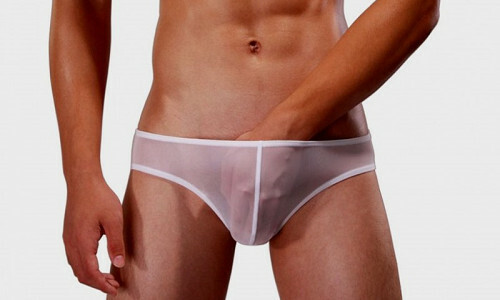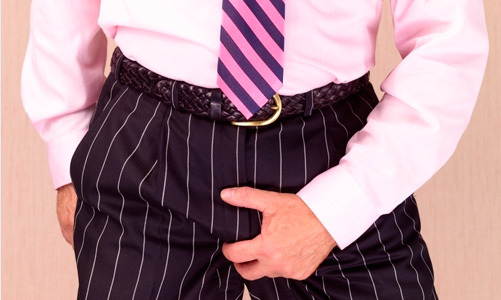Sometimes, after coping with the need for men, a feeling arises that the emptying did not happen completely. This phenomenon is often associated with chronic retention syndrome. Residual urine in men is usually diagnosed when, after evacuation, more than 50 ml of urine remains in the bladder. At times, the volumes of residual urine are calculated in liters.
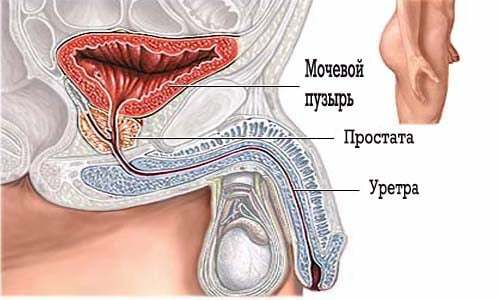
General pathology picture of
The pathologies of the male genitourinary system are a group of very unpleasant diseases with similar signs. The feeling of unfinished urination also applies to such manifestations. In fact, the presence of residual urine by urologists is regarded as a genitourinary pathological symptom, and not as a separate disease.
The main symptom of residual urine is a feeling of incomplete emptying when urinating. Such a syndrome can be manifested by a two-stage urinary process, and some men need to exert additional effort, straining muscles to fully urinate. However, it happens that a man does not have any complaints about uncomfortable urination, although he has a residual urine syndrome.
Common causes of residual urine
There may be many reasons for this condition:
- Benign hyperplastic changes in the tissues of the prostate, in other words, prostate adenoma;
- Neurogenic bladder;
- Urolithiasis, especially when the calculi are localized in the urinary cavity;
- Urethritis or inflammation of the urethra, constriction or stricture of the urethra and other pathologies leading to difficulties in passing the urine through the urethra;
- Cystitis of any origin and form;
- Tumor processes in the bladder of a malignant or benign nature like polyps, cancer, leukoplakia, etc.;
- Innervation disorders of pelvic organs;
- Pathologies of low-tidal organs of an inflammatory nature, for which there are side effects such as urinary irritation.
In general, this kind of pathological condition is caused by various kinds of urinary tract obstruction and neurogenic functional disorders. Since the residual urine is regarded by specialists only as a pathological symptom, in the absence of therapeutic measures a similar phenomenon can provoke the development of a number of complications such as renal failure, pyelonephritis, hydronephrosis, vesicoureteral reflux, etc. Therefore, it is time to identify the causes of incomplete urination and eliminate them, thendangerous complications can be avoided.
Adenoma
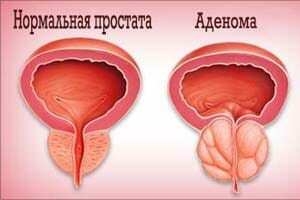 is blamed. Benign prostatic hyperplastic processes are usually found in men over 45 and are manifested not only by disorders of the urinary flow, but also by complete urinary infection. Pathology is an uncontrolled growth of the gland due to age-related changes in tissues with the formation of nodes, proliferation or compaction, etc. Gradually, the formation increases in size, however, metastasis is not observed, because hyperplasia is benign in nature.
is blamed. Benign prostatic hyperplastic processes are usually found in men over 45 and are manifested not only by disorders of the urinary flow, but also by complete urinary infection. Pathology is an uncontrolled growth of the gland due to age-related changes in tissues with the formation of nodes, proliferation or compaction, etc. Gradually, the formation increases in size, however, metastasis is not observed, because hyperplasia is benign in nature.
As the main provoking factor, according to experts, the age appears, with the increase of which the probability of occurrence of an adenoma increases. When the overgrown tissue squeezes the channel of urination, the patient begins to worry about the first manifestations of the disease - difficulty with urination and a feeling of incomplete devastation when coping with the need.
In addition, the patient complains of prolonged urination, frequent urges( especially at night), a thin and sluggish stream with interruptions to the end of the urination process. With neglect of the pathology, painful sensations appear in the lower abdomen, dribbling, painful ejaculation, difficulty with urinary retention when urinating, etc.
Neurogenic bladder
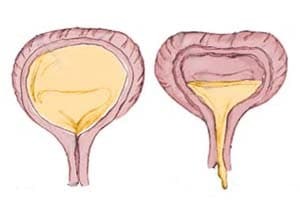 Often the cause of residual urine is a neurogenic bladder - a urinary disorder caused by disorders in the nervous system that is responsible for the urinary function. The causes of a neurogenic bladder can be spinal lesions( hernia or vertebral pathologies, etc.), brain pathology( strokes, hemorrhages or tumors, Parkinson's syndrome, etc.), HIV, peripheral nervous system disorders( eg, diabetes or intoxications, etc.)..
Often the cause of residual urine is a neurogenic bladder - a urinary disorder caused by disorders in the nervous system that is responsible for the urinary function. The causes of a neurogenic bladder can be spinal lesions( hernia or vertebral pathologies, etc.), brain pathology( strokes, hemorrhages or tumors, Parkinson's syndrome, etc.), HIV, peripheral nervous system disorders( eg, diabetes or intoxications, etc.)..
Symptoms of a neurogenic( hyperactive) bladder are usually:
- Frequent urges;
- Incontinence;
- Nocturnal urges;
- Urine leakage;
- Feeling of incomplete emptying, etc.
Usually, the phenomenon of residual urine indicates the presence of spinal lesions in the area just above the sacrum. As a result, the tension of the urethral sphincter occurs, making the urine flow significantly difficult. Treatment of a neurogenic bladder is based on a complex of measures, such as taking medications that correct the nervous system activity, physiotherapeutic sessions, forced urination with the help of tension of the muscle tissues of the press, therapeutic and physical exercises, operational activities.
Urolithiasis
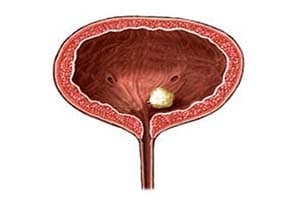 One of the most common causes of residual urine is cystolithiasis( or bladder formation in the stones), which is more common in men. A similar pathology can develop for a number of internal or external causes. Internal causes are caused by chronic infectious foci, metabolic pathologies such as gout, traumatic factors or heredity. External factors provoking cystolithiasis are in the wrong diet, hypodynamia, occupational hazard or drinking regimen.
One of the most common causes of residual urine is cystolithiasis( or bladder formation in the stones), which is more common in men. A similar pathology can develop for a number of internal or external causes. Internal causes are caused by chronic infectious foci, metabolic pathologies such as gout, traumatic factors or heredity. External factors provoking cystolithiasis are in the wrong diet, hypodynamia, occupational hazard or drinking regimen.
Among the most characteristic manifestations of urolithic pathology, pain in the middle of the abdomen is less than the navel, giving off in the groin, the perineum or the penis and scrotum. In the process of urination, a sudden interruption of the jet can occur, after which urinary excretion stops, however, the man feels that the emptying of the bladder has not yet come to an end. In other words, there is a pronounced residual urine syndrome. If a man changes his position, urination may suddenly resume.
Treatment is based on the elimination of calculi, for which the patient can be assigned kamnerastoryayuschie drugs, splitting stone on small particles, which then naturally travel with urine. The technique of lithotripsy or crushing of stones is also popular. It is necessary to comply with a specific diet, drinking regimen, rest and sanatorium treatment.
Urethral stricture
Residual urine often occurs with a pathological narrowing of the urethra. Stricture processes are characterized by replacement of normal mucous layers of the urethra with scar tissue. Such changes lead to significant disturbances in urination. To cause the development of such a disease is capable of many reasons:
- Inflammatory genitourinary processes like urethritis, etc.; Burns from the urethra of a thermal or chemical nature;
- Disrupted blood supply to urethral tissues;
- Traumatic factors like fractures of the pelvis or pelvic bones, trauma due to gross sex, dull bruises of the perineum and groin, etc.;
- Oncological diseases, irradiation treatment;
- Surgical errors like unsuccessful surgical intervention, unprofessional conduct of urological procedures( installation of a catheter, urethroscopy, installation of a penis prosthesis, etc.);
- Congenital anomalies in urethral structures.
In addition to residual urine, a similar pathology is accompanied by difficulties and painful symptoms when urinating, splashing urine when emptying the bladder, frequent urination to urinate, etc.
If the cause is cystitis
Often, the causes of residual urine are the development of cystitis - a pathological condition of the bladder, which is typical for the presence of inflammatory processes of various etiologies. The causes of the occurrence of such a disease are quite numerous, however, the basis for the occurrence of cystitis is usually always an infection. Provocators of infection can act gonococcus, chlamydia, pathogenic fungi, staphylococcus, Pseudomonas aeruginosa, etc.
These microorganisms can enter the bladder with blood, although there is an ascending way of infection. Often inflammation of the bladder occurs as a complication against the background of untreated or untreated pathologies such as urethritis, pyelonephritis or prostatitis, etc. Therefore, it is necessary to start timely treatment of various foci of an infectious nature.
Characteristic signs of cystitis are frequent desire to urinate( literally every quarter of an hour).In this case, the portions of the released urine are significantly reduced. When emptying the bladder, there is a lot of pain, resembling a burning sensation or a cutting sensation. In addition, a man complains of pain in the penis and perineum. Often, the clinic of cystitis is supplemented by general organic intoxication.
Bladder Tumors
Residual urine may also appear due to tumor processes in the urinary bladder tissues. The causes of this phenomenon often occur in harmful occupational conditions, nicotine addiction, radiation exposure, chronic urine, etc. A hematuric symptomatology, incontinence, pain syndrome in the bladder and groin can tell about the malignancy of the tumor. In addition, the man begins to run often on need, and in the process of emptying the bladder, he feels a burning sensation, cutting pain and discomfort. The released urine often becomes turbid, and the general well-being of the patient worsens, hyperthermia and malaise, general weakness in the body.
Residual urine, as can be seen, can result from a variety of genitourinary diseases. Since this condition is fraught with all sorts of complications, it is necessary at the first manifestations to apply to a urologist who will reveal the etiology of the syndrome and make the necessary appointments.
Warning. Only timely actions will help quickly and without consequences to solve the problem of incomplete emptying of the bladder, as well as avoid possible complications, both the syndrome itself and the causes that caused it.

